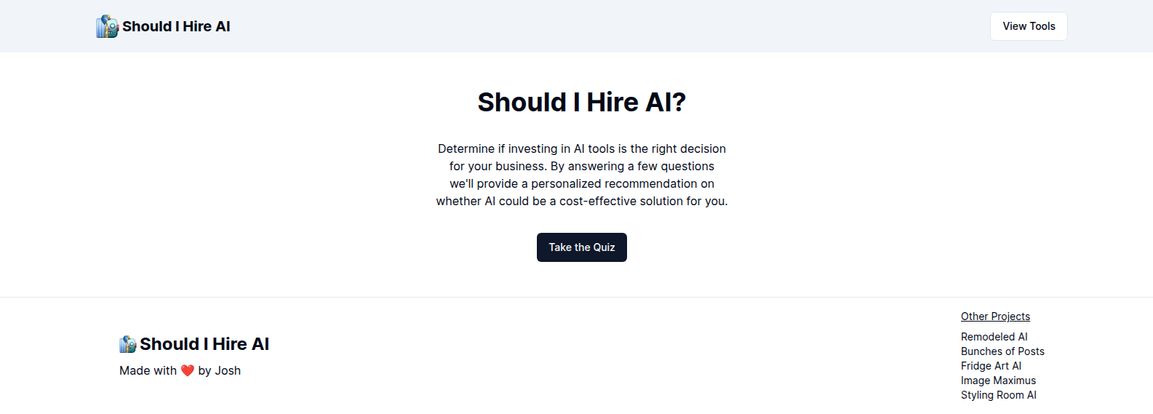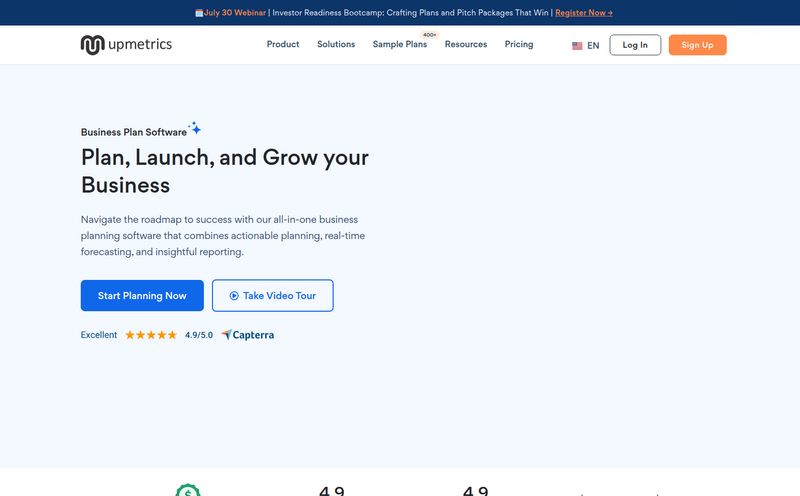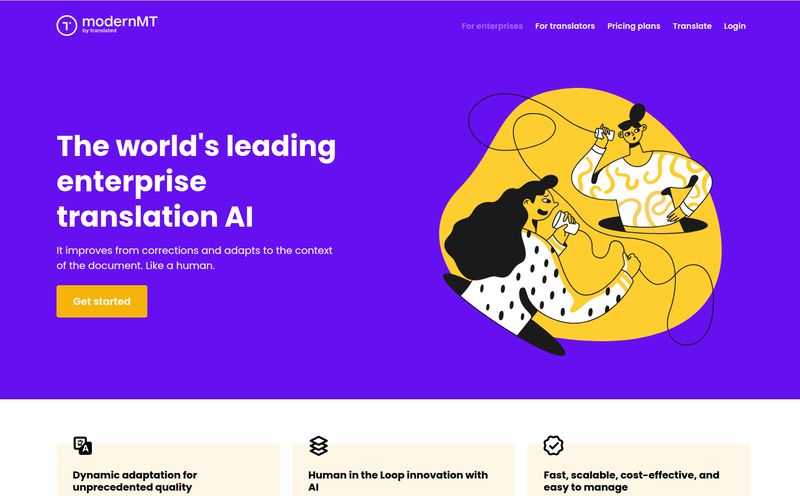We’ve all been there. Huddled in a conference room (or, let’s be real, a Zoom call) staring at a spreadsheet that’s bleeding red. The workload is piling up, the team is stretched thinner than cheap pizza dough, and the inevitable question hangs in the air: “Do we need to hire someone?”
It’s a loaded question, isn’t it? On one hand, you desperately need the help. On the other, a new salary is a massive commitment. It’s a gut-wrenching decision that pits your immediate needs against your long-term budget. For years, this was a simple, painful binary choice. But now, there’s a new variable in the equation, a ghost in the machine whispering, “...or you could just use an AI tool.”
The rise of AI has made this decision even more complicated. Do you hire a junior marketing assistant, or do you subscribe to a suite of AI content and social media tools? Do you bring on a part-time data entry clerk, or automate the process with a clever script? This is the new, modern business dilemma. And I stumbled upon a nifty little tool that tries to give you an actual, data-based answer.
So, What Exactly is Should I Hire AI?
Let me introduce you to Should I Hire AI. In a sea of complex, enterprise-level software, this tool is a breath of fresh air. It’s a super-simple, free-to-use website with one clear purpose: to help you decide whether to invest in a new human team member or an AI solution. It’s basically a quick quiz that gives you a personalized recommendation based on a few questions about your business.
What I love about it right off the bat is its honesty. It feels like it was made by someone who's actually faced this problem. And it was. The site was “Made with ❤️ by Josh,” which gives it that cool, indie-dev vibe. This isn’t some faceless corporation trying to sell you a billion-dollar AI integration. It’s just a tool. A simple, elegant tool to help you think more clearly.

Visit ShouldIHire.AI
How It Works (And Why Simplicity is Its Superpower)
There’s no sign-up. No credit card required. No 14-day trial that you’ll forget to cancel. You just land on the page and click “Take the Quiz.”
The tool then asks you a series of straightforward questions. Think of things like the size of your team, the type of work you need done, and probably some rough numbers about your budget. It’s designed to be quick. The whole point is to give you a rapid diagnostic, like a financial thermometer for your workforce strategy. In my experience, the biggest hurdle for small businesses isn't a lack of options, it's decision paralysis. A tool like this cuts through the noise.
It takes your inputs and crunches the numbers, focusing on the cost-effectiveness of an AI solution versus the loaded cost of a new employee (which, as any manager knows, is way more than just their salary). The result is a simple, data-driven recommendation. It's not magic, it’s just math.
The Great Debate: Human Touch vs. AI Efficiency
Okay, so a tool tells you it might be cheaper to use AI. Case closed, right? Not so fast. This is where your human brain has to take over. I’ve always seen this as the artisan vs. the assembly line dilemma. An AI can be a fantastic assembly line worker—tireless, fast, and incredibly consistent at performing repetitive tasks. Think data analysis, writing boilerplate copy, transcribing audio, or managing a customer service chatbot’s first line of defense.
But an AI can't be an artisan. It can’t replicate the nuance, strategic thinking, emotional intelligence, or creativity of a human. It can’t build genuine relationships with your key clients. It can’t feel the room during a tense negotiation or come up with a truly groundbreaking campaign idea in the shower. Not yet, anyway.
That's why Should I Hire AI is so useful. It’s not meant to be the final word. It’s a starting point. It handles the quantitative side of the argument, freeing you up to focus on the qualitative. It answers the “Can we afford it?” question so you can better tackle the “Is it the right fit for our culture and goals?” question.
The Good, The Bad, and The Realistic
No tool is perfect, especially a free one. Let’s break down what I see as the pros and cons, based on my years of helping businesses scale their traffic and teams.
The Good Stuff
First and foremost, it’s free. In a world of endless SaaS subscriptions, getting this kind of pointed analysis for zero dollars is a huge win. It lowers the barrier to strategic thinking for everyone. It also provides data-driven insights, which helps move your internal conversations away from pure gut feelings. When you can say, “I ran the numbers, and an AI solution could save us X amount over the next year,” you sound a lot more prepared than when you just say, “I think a new hire is too expensive.” Its focus on cost-effectiveness is definately its biggest strength for small businesses and startups watching every penny.
Things to Keep in Mind
Naturally, there are limitations. The tool's output is completely dependent on the accuracy of the information you provide. This is the classic “Garbage In, Garbage Out” principle. If you lowball the time a task takes or miscalculate your current team's capacity, the recommendation will be skewed. It's also a simplified model. Business is messy. The tool likely won’t account for the long-term value of training an employee who grows with your company or the hidden costs of integrating and maintaining a new AI platform. It’s a snapshot, not the full movie.
So, Who is This Really For?
I can see a few groups of people getting a ton of value from this.
- Small Business Owners: This is the prime audience. When you're the owner, marketing director, and head of HR all at once, a tool that simplifies a major financial decision is a godsend.
- Department Managers: If you need to make a case to the C-suite for a new hire or a new software budget, this tool can give you the preliminary data to back up your proposal. It adds a layer of objectivity to your request.
- Solopreneurs and Freelancers: Are you at a crossroads, wondering whether to hire your first virtual assistant or just double down on productivity apps? This can help you weigh the financial implications and decide the best path for scaling your one-person show.
A Quick Peek at the Creator's Other Work
One thing that gave me more confidence in this tool was looking at the other projects by Josh listed in the footer. He’s clearly immersed in the world of practical AI. With names like Remodeled AI, Bunches of Posts, and Fridge Art AI, it’s clear he’s an experimenter, building things to solve real-world (and sometimes just fun) problems. This context matters. It shows that Should I Hire AI isn’t just a random project, but part of a larger exploration into how AI can be made accessible and useful for everyday people and businesses. It’s this kind of passion from indie makers that often produces the most innovative tools.
Frequently Asked Questions
Is 'Should I Hire AI' really free?
Yes, as of this writing, it is 100% free to use. There are no hidden fees or subscriptions. It's a simple, accessible tool for everyone.
What kind of AI tools might it recommend?
The tool itself doesn't recommend specific brands, but it helps you decide if the category of AI tools is a fit. Depending on your needs, this could mean anything from content creation platforms like Jasper or Copy.ai, to customer service chatbots like Tidio or Intercom, or even AI-powered design tools like those found in Canva.
Can this tool replace a financial advisor or an HR consultant?
Absolutely not. Think of it as a first-step diagnostic tool, not a replacement for professional human advice. It’s great for initial analysis and framing your thinking, but major business decisions should always involve expert consultation.
How accurate is the final recommendation?
The recommendation is a data-driven estimate based on your inputs. Its accuracy is a reflection of how realistically you answer the questions. It's best used as a strong guiding point, not an infallible command.
Does the tool save or sell my business data?
Given its simple, no-login structure, it appears to be a session-based calculator that doesn't store your private company information. This is a huge plus for privacy and security.
The Final Verdict
In the grand scheme of things, the conversation shouldn't be about AI versus humans. It should be about creating a synergy between them. How can we use automation to handle the mundane so our people can focus on the magnificent?
Should I Hire AI is a fantastic little tool because it gets this. It doesn't pretend to have all the answers. Instead, it answers one of the biggest, most nagging questions—the one about money—so you can focus on the rest. It’s a simple, smart, and refreshingly honest helper in an increasingly complex world. For a free tool that can be used in under five minutes, it provides a surprising amount of clarity. Give it a shot next time you’re facing that dreaded hiring crossroads. You might be surprised at what the numbers tell you.



